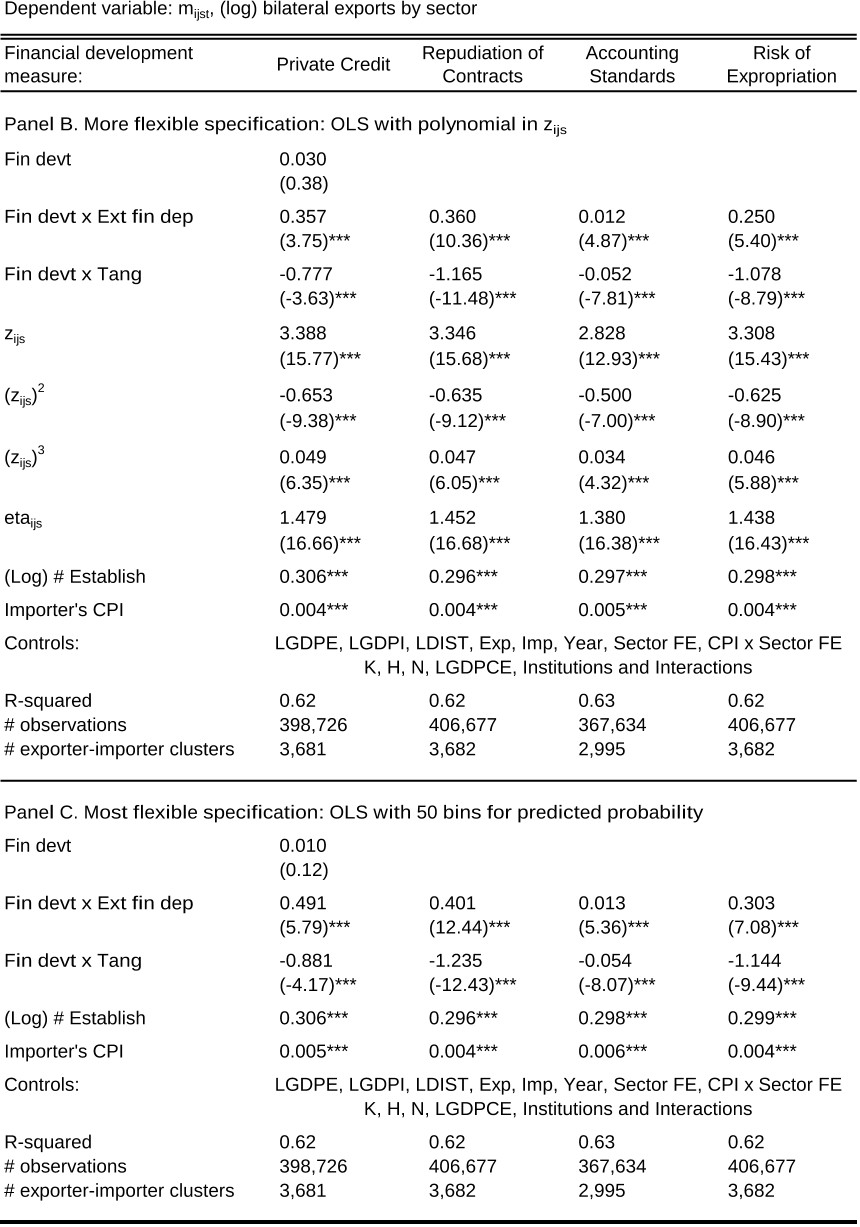Credit Constraints, Heterogeneous Firms and International Trade
Reads0
Chats0
TLDR
This article examined the detrimental consequences of financial market imperfections for international trade and developed a heterogeneous-firm model with countries at different levels of financial development and sectors of varying financial vulnerability.Abstract:
This paper examines the detrimental consequences of financial market imperfections for international trade. I develop a heterogeneous-firm model with countries at different levels of financial development and sectors of varying financial vulnerability. Applying this model to aggregate trade data, I study the mechanisms through which credit constraints operate. First, financial development increases countries' exports above and beyond its impact on overall production. Firm selection into exporting accounts for a third of the trade-specific effect, while two thirds are due to reductions in firm-level exports. Second, financially advanced economies export a wider range of products and their exports experience less product turnover. Finally, while all countries service large destinations, exporters with superior financial institutions have more trading partners and also enter smaller markets. All of these effects are magnified in financially vulnerable sectors. These results have important policy implications for less developed economies that rely on exports for economic growth but suffer from poor financial contractibility.read more
Figures

Table 10. Economic Significance: Predicted vs. Actual Trade Growth 
Table 9. Economic Significance: Comparative Statics 
Table 5. Financial Development and Firm-Level Exports 
Figure 3. The Productivity Cut-off for Exporting 
Table 5. Financial Development and Firm-Level Exports 
Table 1. Export Patterns in the Data
Citations
More filters
Journal ArticleDOI
Bank credit, public financial incentives, tax financial incentives and export performance during the global financial crisis
TL;DR: In this article, the authors investigated the extent to which access to credit, public financial incentives and tax financial incentives affect export performance using the EU•EFIGE/Bruegel•Unicredit data set, covering firms within Austria, France, Germany, Italy, Spain, Hungary and the UK during the 2008 global financial crisis.
Journal ArticleDOI
External Financing, Export Intensity and Inter‐Organizational Collaborations: Evidence from Canadian SMEs*
TL;DR: In this article, the domestic collaborations of small and medium-sized enterprises (SMEs) have a direct relationship with internationalization and resource-based perspective and internationalization theory.
Journal ArticleDOI
Credit constraints and exports of SMEs in emerging and developing countries
TL;DR: In this paper, the authors studied the relationship between credit constraints and exports using a large and heterogeneous sample of small and medium-sized firms from 65 emerging and developing countries between 2003 and 2014, and found robust evidence of a negative, statistically and economically significant effect of financial constraints on both the probability that a firm exports and the share of exports over total sales.
Posted Content
Firms leverage and export quality evidence from France
TL;DR: In this paper, the authors provide a positive answer to this question by finding that among illiquid exporters leverage is negatively correlated with the quality of their exported goods, which is consistent with theoretical contributions in the financial literature predicting a negative impact of debt financing on firms' incentive to undertake quality upgrading investments.
Journal ArticleDOI
Banking Development, Economic Structure and Income Inequality
TL;DR: In this paper, the authors investigated the impact of local banking development on income inequality and the role of the socioeconomic structure in this link, finding that banking development can reduce inequality by affecting geographical mobility and urbanization, while it has modest effects through the development of material infrastructure and human capital.
References
More filters
Posted Content
Law and Finance
Rafael La Porta,Rafael La Porta,Florencio Lopez de Silanes,Florencio Lopez de Silanes,Andrei Shleifer,Andrei Shleifer,Robert W. Vishny,Robert W. Vishny +7 more
TL;DR: This paper examined legal rules covering protection of corporate shareholders and creditors, the origin of these rules, and the quality of their enforcement in 49 countries and found that common law countries generally have the best, and French civil law countries the worst, legal protections of investors.
Journal ArticleDOI
Law and Finance
TL;DR: In this article, the authors examined legal rules covering protection of corporate shareholders and creditors, the origin of these rules, and the quality of their enforcement in 49 countries and found that common-law countries generally have the strongest, and French civil law countries the weakest, legal protections of investors, with German- and Scandinavian-civil law countries located in the middle.
Journal ArticleDOI
The Impact of Trade on Intra-Industry Reallocations and Aggregate Industry Productivity
TL;DR: This paper developed a dynamic industry model with heterogeneous firms to analyze the intra-industry effects of international trade and showed how the exposure to trade will induce only the more productive firms to enter the export market (while some less productive firms continue to produce only for the domestic market).
Journal ArticleDOI
Finance and Growth: Schumpeter Might Be Right
TL;DR: In this paper, the authors examined a cross-section of about 80 countries for the period 1960-89 and found that various measures of financial development are strongly associated with both current and later rates of economic growth.
ReportDOI
Financial Dependence and Growth
Raghuram G. Rajan,Raghuram G. Rajan,Raghuram G. Rajan,Luigi Zingales,Luigi Zingales,Luigi Zingales +5 more
TL;DR: This paper examined whether financial development facilitates economic growth by scrutinizing one rationale for such a relationship; that financial development reduces the costs of external finance to firms, and found that industrial sectors that are relatively more in need of foreign finance develop disproportionately faster in countries with more developed financial markets.